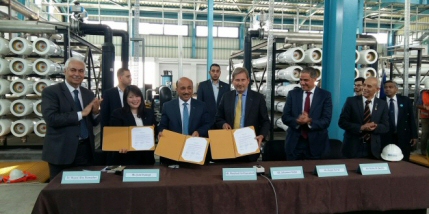EU Commissioner Johannes Hahn, responsible for European Neighborhood Policy and Enlargement Negotiations, visited the EU-funded seawater desalination plant in southern Gaza, today.
PNN reports, today, that the first phase of the desalination plant is in its final stage of construction, and is the largest being built, so far, in Gaza. The EU has invested EUR 10 million during this phase which, when fully operational, will produce 6,000 m3 of potable water daily. This will provide over 75,000 Palestinians with safe drinking water—approximately 35,000 people in Khan Younis and 40,000 people in Rafah, southern Gaza Strip.
During the visit, EU Commissioner Johannes Hahn announced an additional funding of EUR 10 Million Euros for the second phase of the desalination plant. The works of this phase will start mid-June 2016 and are expected to be completed within 36 months. This is part of the European Union commitment to expand the capacity of the plant. Once the second phase is completed, the plant will produce of a total of 12,000 m3 ofsafe drinkable water, each day.
The construction of the plant is led in partnership with the Palestinian Water Authority (PWA) and Gaza’s Coastal Municipalities Water Utilities (CMWU).
”Water and natural resources have been significantly damaged after the continuous years of closure and conflicts in Gaza. As a consequence, nearly 95% of water in Gaza is considered unfit for human consumption. Therefore we are supporting this plant that will provide clean fresh water for 150,000 Palestinians,” said EU Commissioner Johannes Hahn.
The plant will undergo extensive tests, this summer, to check the proper functioning of the pumps, filters and reverse osmosis membranes. The quality of the desalinated water will be tested to ensure that it meets the required standards before it starts being distributed to families.
“The near-completion of the first phase of this ambitious project is a symbol of hope and positive change in Gaza, increasing access to safe water which is essential for life and well-being,” said June Kunugi, UNICEF Special Representative for the State of Palestine.
“We want to thank the European Union for its generous support, which will help meet the urgent needs of vulnerable children and families in a sustainable manner.”
Water is a precious commodity in Gaza; 95 percent of the water extracted from the coastal aquifer is not fit for human consumption.
A 2012 United Nations report warned that Gaza’s sole aquifer may become unusable by the end of this year, with damages becoming irreversible by 2020.
Seawater desalination is one of the strategic options chosen by the Palestinian Water Authority to help provide 1.8 million Palestinians in Gaza — including nearly one million children — with safe drinking water. The desalination of seawater from the Mediterranean is essential to curb over-extraction of groundwater from the coastal aquifer, and to prevent an environmental disaster.


